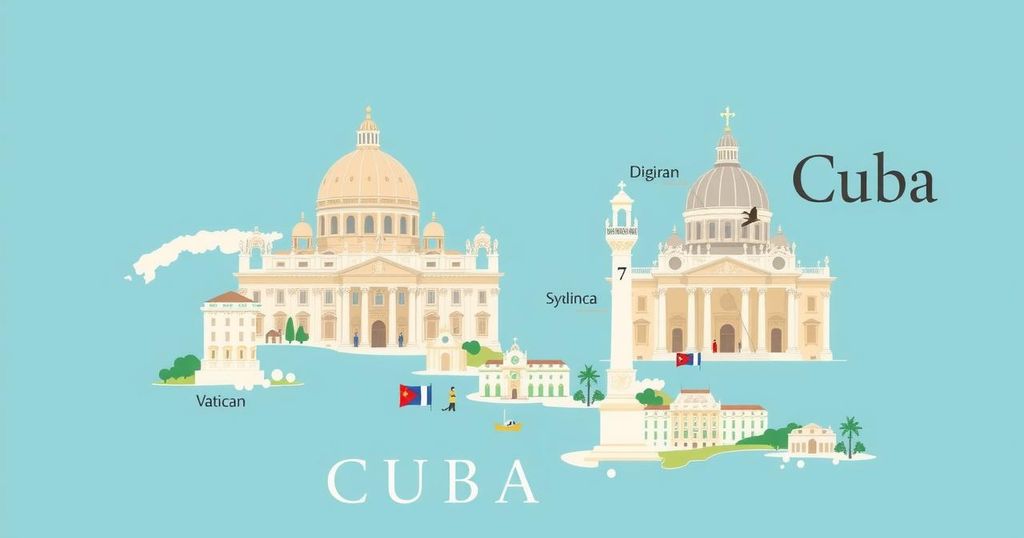Politics
BENEDICT XVI, BIDEN, BRAZIL, CASTRO, CORRUPTION, CUBA, DEMOCRACY, DIPLOMATIC RELATIONS, FIDE, FORUM, GAES, GAESA, GRUPO DE ADMINISTRACIÓN EMPRESARIAL S. A, GRUPO DE ADMINISTRACION EMPRESARIAL S. A, HUMAN RIGHTS, LATIN AMERICA, NORTH AMERICA, SANCTIONS, SAO PAULO, SOUTH AMERICA, U. S, U.S.-CUBA RELATIONS, VENEZUELA
Fatima Khan
0 Comments
Cuba and the Vatican: A Disappointing Diplomacy Amidst Human Rights Violations
The Vatican engaged in negotiations to remove Cuba from the terrorism sponsors list during President Biden’s last weeks in office, resulting in a deal that fell short of liberating significant political prisoners and lifting restrictions on a military-controlled organization. This has raised concerns regarding the Vatican’s commitment to human rights. The relationship between the Vatican and Cuba has persisted for over six decades, resulting in ineffective diplomatic efforts that fail to address the regime’s oppressive tactics.
In the closing days of President Biden’s administration, the Vatican engaged in discussions to remove Cuba from the list of state sponsors of terrorism, further illustrating its enduring connection with the Cuban regime. This negotiation highlights the Church’s obligation to cease its endorsement of the Cuban dictatorship and to confront the ongoing violations of human and religious rights.
The terms of the agreement included the release of 553 political prisoners from the oppressive Cuban government, which holds over 1,200 in custody. Additionally, restrictions on the Grupo de Administración Empresarial S.A. (GAESA), a military-operated entity that significantly influences Cuba’s economy and supports the dictatorship, would be lifted. In return, the Vatican agreed to back Cuba’s designation removal from the terrorism sponsor list.
Pope Francis’s role as a mediator has elicited disappointment. Following Donald Trump’s reclassification of Cuba as a state sponsor of terrorism, the release of political prisoners ceased, revealing the regime’s true character as it leveraged prisoners for political maneuvering. Thus far, fewer than 200 prisoners have been freed under this deal, raising questions about the Vatican’s commitment to human rights.
The Vatican’s relationship with Cuba spans more than six decades, having undergone various phases since the 1959 revolution. Pope John XXIII excommunicated Fidel Castro in 1962, yet several papal visits, including those by John Paul II, Benedict XVI, and Francis, have perpetuated the notion of fostering religious tolerance without instigating real change for the Cuban populace.
Despite the philosophical discord between Marxism and religion, Fidel Castro’s acknowledgment of their potential synergy in the 1980s led him to exploit religion strategically. The São Paulo Forum, which emerged in 1990, sought to unite leftist groups in Latin America under a banner that nuanced the relationship with religion, creating space for leaders such as Hugo Chávez to manipulate religious rhetoric for political gain. Pope Francis has echoed this sentiment, reiterating support for such agendas.
During John Paul II’s 1998 visit to Cuba, he was instrumental in reinstating Christmas as a national holiday but failed to confront the prevailing government atrocities. Although his legacy includes staunch opposition to communism, his visit inadvertently lent the Cuban regime a semblance of legitimacy that it continues to exploit.
In contrast to his predecessors, Pope Francis has adopted a more lenient attitude toward leftist regimes, failing to vehemently criticize authoritarianism. His emphasis on dialogue over condemnation has compromised perceptions of the Church as a proponent of human rights, casting doubts on his motivations.
The Obama administration’s concessions to Cuba, including cultural exchanges and relaxed embargoes, were facilitated by the Vatican but proved ineffective in enhancing the lives of Cuban citizens. The inviting reception of Raul Castro at the Vatican during the same year as Francis’s visit underscores an approach deemed diplomatic yet ultimately emboldening a regime that persists in undermining the Catholic faith.
Religious figures in Cuba continue to face severe persecution, exemplified by individuals such as Father José Conrado Rodríguez and Pastor Alain Toledano, whose church was demolished. Furthermore, groups like the Ladies in White experience arrest and violence during peaceful protests. The Vatican’s involvement has yielded no substantial advancements in religious freedom or human rights for the Cuban populace.
As global challenges mount, the Church’s moral authority is needed more than ever. The Vatican must reclaim its role as an advocate for hope and justice amidst Cuba’s destabilizing influence in regional democracies that has persisted unchecked for years. Cubans implore the Vatican to embrace its responsibility as a true champion for the people and urge fellow Catholics to uphold their convictions, holding the Church accountable against socialist falsehoods.
In summary, the Vatican’s recent negotiations regarding Cuba expose a troubling relationship characterized by ineffective diplomacy and inadequate support for human rights. Essential terms of the deal, which included the release of political prisoners and lifting of economic restrictions, fell short of yielding tangible improvements for the Cuban people. The historical context highlights a complex legacy of papal engagement that, rather than advocating for genuine change, has at times inadvertently legitimized oppressive regimes. Moving forward, the global community implores the Vatican to assume a more robust role in advocating for justice and freedom in Cuba.
Original Source: www.realclearworld.com




Post Comment